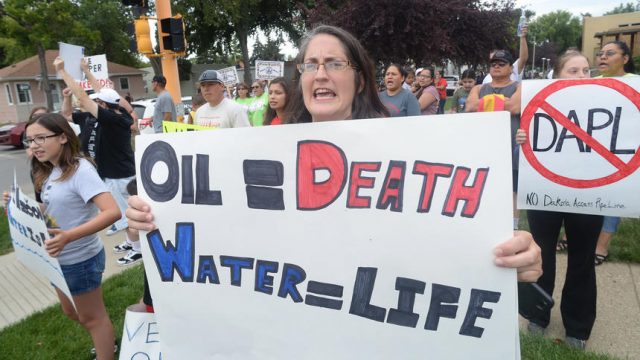Kevin Killough: Water Is Life? Energy Is Life.

Protest organizer Kristen Kelsch hold a sign and chants across the street from the State Capitol in Bismarck on Thursday. A line of police prevented Kelsch and others from hold the protest to the Dakota Access Pipeline on the Capitol grounds
The “water is life” slogan has hash tagged its way across the internet and serves as the rallying cry for people who oppose the Dakota Access Pipeline—and pretty much the entire petroleum industry.
This attitude speaks of a privileged, first-world viewpoint with little understanding or concern for where our modern sanitation comes from and how important it is to healthy lives.
The DAPL protesters argue pipelines sometimes have accidents that pollute water. Therefore all pipelines are a threat to drinking water everywhere.
Accidents sometimes happen, but thinking this way about the impacts of the petroleum industry is a lot like looking at beneficial drugs solely in terms of their occasional side effects, with no consideration of their benefits.
The truth is—and this really shouldn’t be a surprise to anyone—our water does not come directly from lakes and rivers.
Water directly from nature is naturally polluted. It’s full of waterborne illnesses, many of which are deadly and none of which are beneficial.
These include cholera, giardiasis, dysentery, and typhoid fever, among many others.
[mks_pullquote align=”right” width=”300″ size=”24″ bg_color=”#ffffff” txt_color=”#000000″]Nature doesn’t supply us with clean drinking water that the petroleum industry pollutes. Nature supplies us with dirty, undrinkable water that we then clean through processes that require a lot of energy.[/mks_pullquote]
To make it potable, water must be cleaned through an energy-intensive industrial process.
To get an idea of how much energy it takes to supply a population with clean drinking water, a 2014 congressional service report estimated public drinking water utilities consume about 30 to 40 percent of a municipality’s energy bill.
Nature doesn’t supply us with clean drinking water that the petroleum industry pollutes.
Nature supplies us with dirty, undrinkable water that we then clean through processes that require a lot of energy.
Some people argue there are other means to get our energy, and this would be true if the only thing to consider is the ability to produce energy. That energy must also be reliable and affordable.
Germany has one of the most expansive policies of renewable energy, with about 13 percent of the country’s energy coming from renewables, and they pay three to four times more for their energy than we do here in the U.S.
And this figure doesn’t consider the budget-draining subsidies the renewable energy industry requires.
They now have a term in Germany for a problem that has arisen as a result of its energy policy. They call it energy poverty.
Nothing is produced without energy. If you make energy more expensive, you make everything more expensive.
Unreliable, expensive energy means more poverty, more hunger, and reduced access to clean water.
Pipelines are crucial to getting cheap, reliable energy to markets. They’re one piece of an industry that makes our modern lives long, healthy, and comfortable.
In fact, energy is life, and that should be a rallying call for the production of fossil fuels and the development of the infrastructure that supports them.




